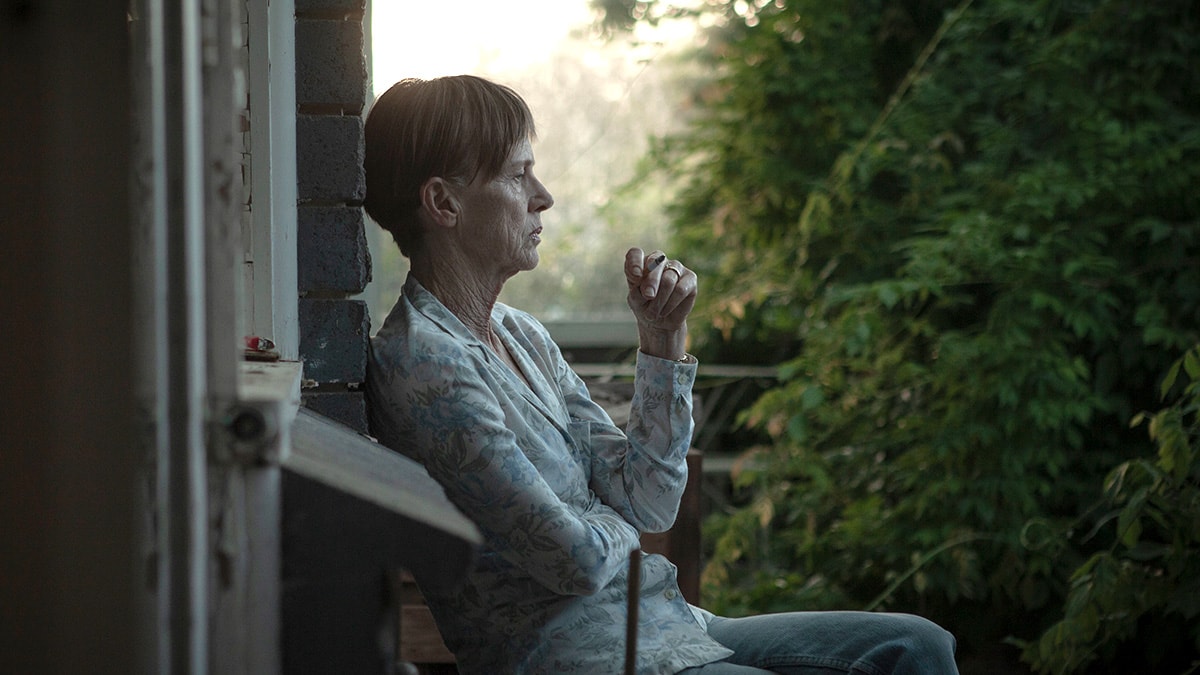Nitram is a biographical and psychological account of a young man living a life of isolation and frustration. He develops an unexpected friendship with a reclusive heiress, and when that relationship meets its tragic end, his loneliness and anger culminate into one of the most nihilistic and heinous acts ever committed in Australian history.
The film is directed by Justin Kurzel, whose breakout debut feature, Snowtown (2011), was based on the infamous South Australian Snowtown murders. He went on to direct 2015’s Macbeth, 2016’s Assassin’s Creed, and 2019’s True History of the Kelly Gang (based on Peter Carey’s award-winning novel).
Kurzel’s films tend to focus on violent, outsider, alienated men. Kurzel and Snowtown screenwriter Shaun Grant have gone from grisly and raw to smug and almost snobbish. They set up Nitram’s (Caleb Landry Jones) family as being down on their luck, from a lower socio-economic background, driving an almost thirty-year-old car. By not using the actual name of the person the film is based on, Kurzel and team are creating an almost Voldemort effect (he who cannot be named), which kind of misses the point. If they did not want to use his name, why not write their own fictional story inspired by Bryant instead of insisting on this affectation?
Because the audience knows what the protagonist will become, there is a lot of tension that can be easily manufactured and manipulated in Nitram, which almost feels cheap and exploitive at times. Later in the film, when Nitram is becoming more and more obsessed with America, with home-movie making and especially with guns, there are moments that leave you cold. The film seems to want to raise more questions than it tries to answer, yet also seems to pay lip service to many of the things we eventually learn about the Port Arthur shooter much later. When Nitram starts buying semi-automatic rifles in a gun store or casually discussing the sale of a military-grade gun in a man’s home where children are playing and watching TV, it almost becomes farcical. It could have been a serious note of exploration on society and the inadequate Australian mental health system of the 1980s and 1990s.

One of the crucial areas of his life that are shown rather quickly at the beginning of the film, then only touched upon here and there, is Nitram’s mental health condition, his medication, and what he was being treated for. There is a really bothersome scene with Nitram and his ‘mother’ (who is never named but is based on Carleen Bryant), played by the multi-award-winning actor Judy Davis, at his doctor’s office trying to get a new script. The mother seems more interested in getting a new script for his medication so that he can keep drawing a Centrelink pension rather than getting better or getting the help he desperately needs.
Caleb Landry Jones gives a gripping performance with what he has to work with. He was awarded Best Actor at Cannes, where the film had its premiere. The jarring nature of the film has nothing to do with the actor’s portrayal; it has a lot more to do with the choices made by Kurzel and Grant. Kurzel’s wife, Hobart-born Essie Davis, plumped up for this role as the eccentric millionaire, Helen Mary Elizabeth Harvey, modelled on the Tattslotto heiress. She has her teeth in braces, badly dyed hair in a floppy top knot, with a penchant for warbling along to Gilbert and Sullivan and dressing up like she is a character in the Mikado.
Judy Davis plays ‘the mother’ of Nitram, and her portrayal is often rather cold and detached, especially in a moment when she recounts a story of how she lost Nitram in a shop briefly when he was a child. There is almost a relief in her voice when she thought she may not find him at all. Judy Davis is an incredible performer but given very little to do in the film. Anthony La Paglia plays Nitram’s father, Maurice. La Paglia’s performance shows the usual warmth and depth he so easily delivers when he is in a patriarchal role. Maurice’s alleged suicide is often cited as one of the reasons for the eventual tragedy. However, there are still many unanswered questions about Maurice’s death, especially Bryant’s involvement (which is glossed over), adding to the whole ‘innocent misfit’ narrative Kurzel has structured the entire movie around.
The two biggest issues with this film are its historical accuracy and how it portrays Martin Bryant. There are many glaring omissions in this film, especially when it comes to Bryant’s relationships. Bryant was known to have had several romantic relationships. However, there is no evidence Helen and Bryant were ever lovers. However, there is good evidence by people who knew Bryant and documented police interviews that he was constantly getting in trouble for attempting to fondle young schoolgirls on the local bus. At one point, he was even banned from approaching a local Catholic school.

The film tries to jarringly move away from the sensationalism of what Nitram is, with a post-script and several more captions, regarding the gun laws the Howard government introduced in the wake of the massacre following the surge of political and public support for change. A more nuanced and completely fictionalised story, like the approach Gus Van Sant’s Elephant took to portray the 1999 Columbine shooting, may have served the filmmakers better, giving a more legitimate interrogation of gun violence and mental health than the sensationalised version Kurzel has gone for here.
The moral high ground they are trying to reach at the end of the film by stating the lack of compliance by state governments in policing firearms in Australia (as there are more firearms owned in Australia now than in 1996) is misleading. Statistics show that while the number of weapons people own has increased, people with gun licenses have decreased. But that itself is misleading as the film accurately portrays the fact that Bryant was able to purchase a Colt AR-15 semi-automatic legally without a license and without the weapon being traced, which is the real issue rather than the view Kurzel is taking at the end.
The approach of the filmmakers in Nitram, to fictionalise and create a sympathetic image of Bryant could be dangerous. From the beginning, the Port Arthur massacre and Bryant himself have been adopted by conspiracy theorists and, to an extent, a kind of creation myth for many far-right extreme groups in Australia. And there is a danger that a portrayal of Bryant like this could easily fuel these groups even further. Overall, this is an uncomfortable, jarring, dangerous and yet terrifyingly gripping film.
There has been a very strong backlash over this film being produced and screened in Australia. You almost wonder if the film was made to tell the victims’ and their families’ stories and tragedy, or if it is merely sensationalism.
Fun Fact:
According to director Justin Kurzel, Texan actor Caleb Landry Jones worked on his Australian accent while in quarantine after arriving in the country, by watching re-runs of 1990s episodes of Hey Hey It’s Saturday (1971), Neighbours (1985) and Home and Away (1988).




COMMENTS